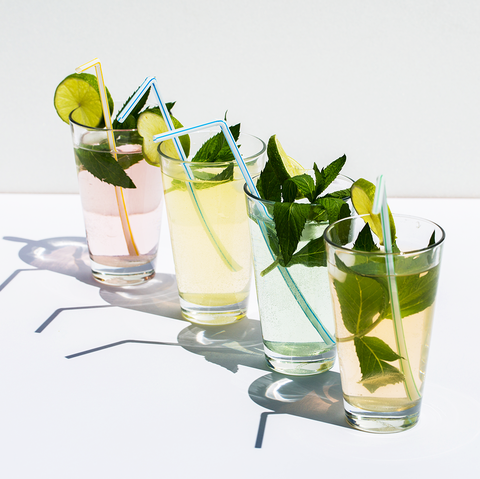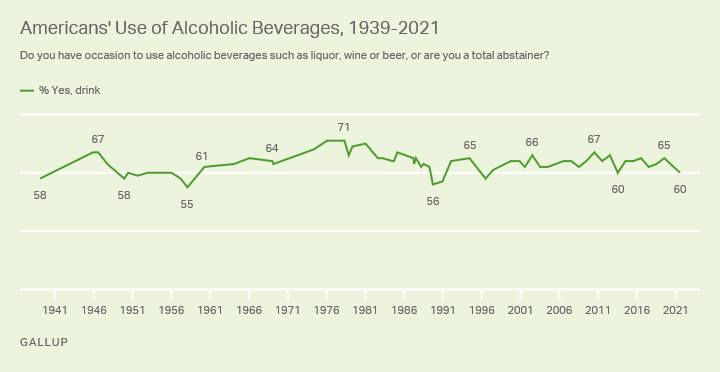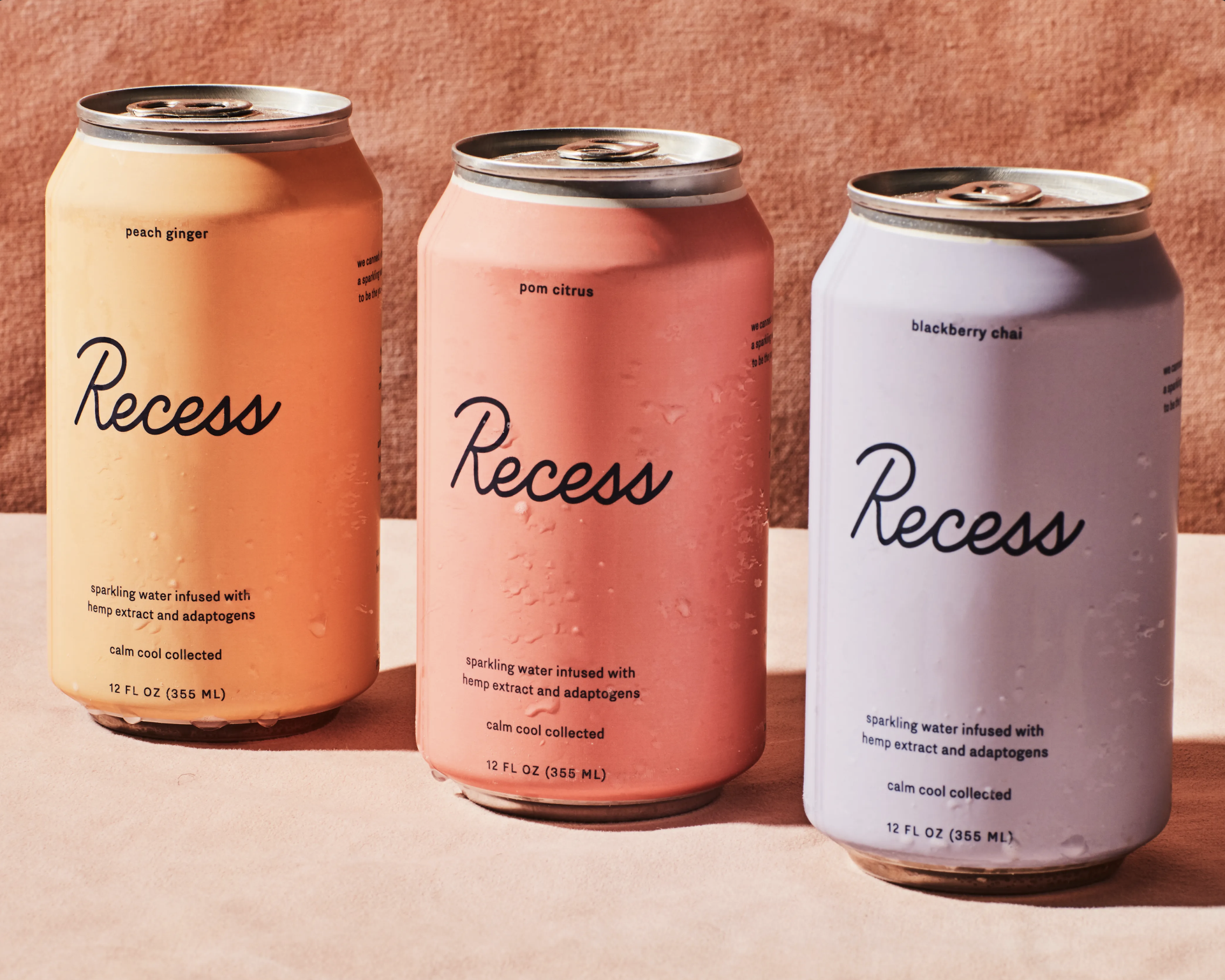Written by Nol
There is no doubt that COVID 19 has affected all of our lives in more ways than one – from who we get to see, where we get to go, and most importantly, the health of ourselves and our loved ones. One health trend that The Nol Team has been keeping an eye on as of late, however, is what it means to be ‘sober curious’. Nol first came across the term while doing research on the growing popularity of hard seltzers back in 2019, and has observed the ways in which sober curiosity has changed the way we think about sobriety. With sober curiosity and the pandemic in mind, how has the nationwide consumption of alcohol changed? Has it decreased? Increased? There are a lot of different studies circulating that can help answer these questions, as well as changing circumstances regarding new health trends that can help us understand why these statistics say what they do.
Post Pandemic Sobriety
The Gallup by Megan Brenan
Since lockdown first hit in March 2020, the level of nationwide alcohol consumption has certainly changed, but not as concretely as you might think. Unfortunately, the isolation of the pandemic halted the progress of many who were in recovery, and even brought people who initially may not have had an alcohol problem to alcoholism. A study done in March 2021 showed that 1 in 4 American adults drank more during the pandemic to cope with the stressful circumstances of the time, alongside a new RAND Corporation study that states that pandemic alcohol use actually declined for men, and remained stable for women. However, according to a poll done by The Gallup, fewer Americans say or report they are drinking alcohol as of August 2021, with a decrease from 65 percent in 2019 to 60 percent in 2021. Additionally, while hard seltzers took the nation by storm in 2019, Americans have recently been found to be drinking the fizzy drink remarkably less – with Coors shutting down its seltzer line in 2021 and Boston Beer tossing ‘millions of cases’ of unsold Truly last fall. With these slightly contradicting statistics, it seems that whether or not people drank more or less nationwide during worldwide lockdowns is inconclusive. While some people drank more to cope with the stress of the time, others gave up drinking entirely with the statistical increase of hyper awareness for one’s health. One thing that is certain, however, is that with these two extremes, the topic of sobriety has come into conversation – and not in a way you might first expect.
Sober Curious
More Than a Trend
Alex Williams of the New York Times explores the ways in which views of sobriety have changed over time; recently taking a new form a choice to be made not only in the case of alcoholism but as a trend for drinkers of all kinds. Instagram hashtags ‘mindful drinking’ and ‘sober curious’ are on the rise, and people participating in this new wave sobriety ‘will tell you they never had a drinking problem,’ Williams writes, ‘they just had a problem with drinking’.
‘Sober curious’ is centered around the fact that you don’t have to be an alcoholic to choose to become sober; most do it primarily for the health benefits, both physical and emotional. Not consuming alcohol helps to increase general health, mental clarity, and energy, while also allowing for longer and deeper sleep, healthier skin and complexion, decreased risk of cancer, and better weight management and eating habits. On the emotional side, sobriety can help with anxiety relief, depression relief, emotional stability, more motivation, increased confidence, and overall better well-being.
There is something to be said about sobriety turning into a trend. Sobriety has not always been looked on positively; the word carries the ‘recovering’ feeling as if someone who doesn’t drink only does so because they have to. Moreover, having a more balanced relationship with drinking can be difficult when most social and networking events revolve around alcohol. This may leave non-drinkers at quite a loss when it comes to social interaction. As we learned during the lockdown era of the pandemic: humans need to socialize.
During research conducted by The Nol Team, it was revealed that among the top wellness topics prioritized among individuals was community. In a Health and Wellness Lifestyle Survey conducted by American Lives, 25 percent of respondents were very interested in living in a wellness community either full-time or part-time. Alarmingly, however, research points to a worldwide decline in social capital, with decreasing trust in government, fellow citizens/neighbors, and strangers alike (GWI).
Being sober in a world that yearns for community – and so often uses alcohol to achieve that – is no doubt difficult. With sober curiosity, we are all invited to reconsider such norms and even wonder if this new trend may lead to full normalization of sobriety.
Living in NYC Alcohol-Free
Sober Bars and Alcohol-Free Spirits
New York has much more to offer than you might think regarding sober late-night activity. Listen Bar by Lorelei Bandrovschi is a sober bar that is both virtual and ‘sometimes IRL’ in NYC. In Brooklyn, Tasha Blank runs ‘The Get Down’, where there are no drinks allowed on the dance floor. In order to find events for The Get Down, head to her website and text the number provided with the name of your city for ‘secret invites’. There is also an alcohol-free bar in Greenport called ‘Getaway’, which is currently hosting ‘The Blue Light Speak Cheesy’. There are loads more options in the booze-free social scene worth exploring, so get searching in your local area!
Additionally, there is a large number of high-quality alcohol-free spirits such as Kin Euphorics by Jen Batchelor and Bella Hadid, Seedlip which is an alcohol-free distiller in England (and apparently tastes strikingly like gin), as well as Nol’s favorite: Recess. Recess is a no-brainer option in the pursuit of being sober-curious. With an assortment of delicious flavors, such as blackberry chai and peach ginger, the palet explosion that fruity cocktails and fizzy drinks often bring is evoked in a similar way, just without the alcoholic component. The drinks include whole plant extract, lemon balm, American ginseng, and L-theanine – all contributing to calm the mind, boost vitality, improve focus and memory, and overall centering and easing the body. With ingredients like these, instead of pouring yourself a glass of wine post-work, you can wind down and relax while knowing that you won’t have to wake up reaching for the advil bottle.
If there is anything we have learned in trying to understand sober curiosity, it's that when it comes to alcohol, everyone deserves to have a choice as to whether or not to partake in drinking culture. With sober curiosity, less and less people will give concerned questioning as to why their fellow neighbor chooses not to drink, and more and more people will evade the feelings of exclusion in social gatherings without an alcoholic drink in hand. And that is something we definitely cheers to!
May you be well,
The Nol Team
Stay updated on the latest at Nol Pov by signing up for our monthly newsletter below! #findyoursanctuary
This article is for your enjoyment.
The views expressed in this article intend to highlight alternative studies and induce conversation—even if and to the extent that this article features the advice of physicians and medical practitioners. This article is not, nor is it intended to be, a substitute for professional medical advice, diagnosis, or treatment, and should never be relied upon for specific medical advice.





